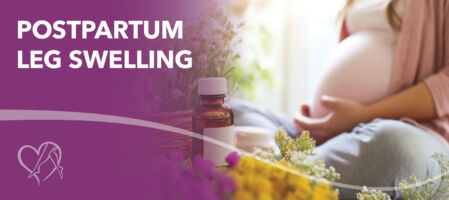
Bringing home a new baby is exciting, but your body is still healing. One of the most common changes some new moms find themselves working to manage involves leg swelling, also known as edema. In most cases, this puffiness is normal and fades quickly. Other times, swelling can be a sign of an underlying vein disease, such as chronic venous insufficiency or even a blood clot. Knowing the difference helps you protect your health while you care for your little one.
In this blog, we will discuss the causes and symptoms of postpartum leg swelling and lay out some potential treatment options.
Are you curious to know whether your postpartum leg swelling may be symptomatic of underlying vein disease? There’s no need to wait for answers, the board-certified experts at Center for Vein Restoration (CVR) are available to provide ongoing support through our immediate consultations, customized treatment plans, and follow-up care. Call 240-965-3915 or visit our ONLINE SCHEDULING PORTAL to book your consultation and start your journey to feeling better inside and out.

During pregnancy, your body makes extra blood and fluids to support the baby. After birth, that fluid shifts toward your feet and ankles before your kidneys can flush it out. Swelling is common, but it should improve each day. A sudden increase is a sign of trouble, according to the Cleveland Clinic, which adds:
“Swelling [from extra fluids] is typically normal and your body’s way of getting rid of fluid you accumulate during pregnancy. Your swelling should go down within a week. When swelling comes with symptoms like chest pain and trouble breathing, it could be a sign of something more serious.” -Cleveland Clinic
Typical postpartum edema is mild, affects both legs, and improves when you elevate your feet. In addition to a sudden swelling level increase, you should contact your physician if:
According to the Mayo Clinic, a leg that has changed color or swells and is painful or warm to the touch is a symptom that requires urgent medical care.
Pregnancy hormones relax the vein walls. The growing uterus presses on pelvic veins, and blood volume climbs by up to 50 percent, as per Science Direct. This raises pressure inside the leg veins. Over time, tiny one‑way valves that keep blood moving up toward the heart can stretch out and leak. According to Johns Hopkins Medicine, pregnancy and varicose veins increase the risk of superficial thrombophlebitis and chronic venous insufficiency.
Postpartum swelling typically begins to fade after about a week as your body rebalances fluids. Consider these simple steps to increase your comfort level:
If swelling still isn’t easing after a full week, or if it returns later in the day, it’s time to schedule a vein check.
During a postpartum vein check, a vascular technician will ask about your pregnancy, delivery, and any leg pain, swelling, or visible veins that have appeared. Your specialist then examines the legs and pelvic area and glides a handheld ultrasound over your skin to map blood flow as you rest comfortably on an exam table. This brief but thorough scan reveals varicose veins, blood clots, or early venous insufficiency signs that can surface after childbirth.
Afterward, your vein specialist sits down with you to review the ultrasound images in clear, non‑technical language, explaining what each finding means in terms of long‑term vascular health. If your veins look healthy, you’ll be given simple recovery tips—similar to the home remedies we’ve outlined above—to keep your circulatory system working well. If concerns are discovered, your specialist customizes a plan for a minimally invasive vein treatment procedure such as laser or radiofrequency ablation, setting up follow‑up appointments and ensuring you feel supported throughout recovery.
The type of vein treatment you’ll receive ultimately depends on the severity of your symptoms, your medical history, and your personal preference.
Still unsure whether your postpartum swelling is normal? Try these self-check steps:
✔ Press your thumb over your shin for a few seconds: if an indent remains, it’s known as pitting edema, which, while usually not a cause for concern during pregnancy, can be a symptom of several conditions.
✔ Measure your ankle with a soft tape in the morning and again at night: an increase in size throughout the day suggests fluid buildup.
✔ Rate your discomfort: ache, itch, or burning that worsens when standing often suggests vein disease.
If any box worries you, book a same‑day scan and let a CVR vein expert give you clear answers. Your legs—and your growing family—will thank you. Call 240-965-3915 to speak with a Patient Services Representative or schedule your consultation online at a CVR near you today.

A little postpartum leg swelling is normal, but lasting or painful swelling can point to vein disease, such as chronic venous insufficiency or even a blood clot. Pay close attention to your symptoms, practice basic home care, and seek the advice of a vein expert if signs don’t improve quickly.
Remember, CVR is here to guide you from first ultrasound to final follow‑up, so you can focus on what matters most—enjoying life with your new baby. Join the thousands of new moms who have trusted CVR for safe, proven relief. Use our ONLINE SCHEDULING PORTAL or call 240-965-3915 to speak with a Patient Services Representative and book an appointment at a CVR near you today—your legs (and your little one) deserve the very best!
